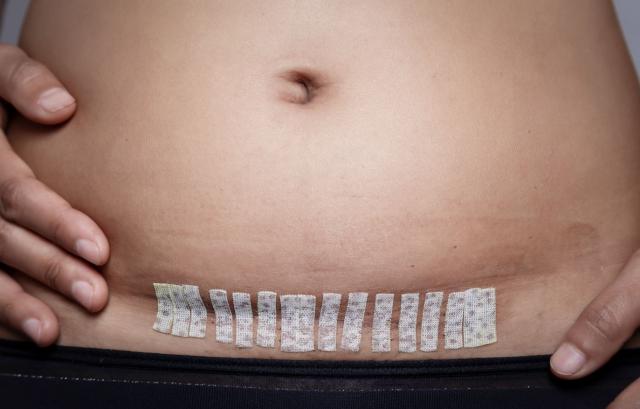When I was pregnant with my son Teddy I really looked forward to having him delivered in our local birthing unit.
It was such a lovely relaxed environment and the midwives had really made me feel confident that having a baby wasn’t the terrifying nightmare portrayed on TV.
Great, I thought, I can do this, it's going be amazing! That was until a late scan at week 35 and we found out that Teddy was breach. After having a failed ECV, I elected for a C-section.
The most striking thing to me even now is how little information I got about it. I was given a website to visit by the anaesthetist I saw a week before the procedure, but other than that I knew very little. Surprisingly, C-sections aren’t that unusual with 15% of women having one.
Until I became pregnant I had always believed that having a section would be easier than a normal delivery, and believed many of the myths around it (no, your stomach does not shrink quicker).
I had also completely overlooked the fact that it is a major operation, and that recovery time is a lot longer than giving birth virginally.
Now I am pregnant with my second child, I am once again looking forward to hopefully having a natural birth. This time I am more prepared for the possibility of a caesarean.
After speaking to other women that had also gone through one, I have made a list of stuff which I wish I'd known the first-time round!
1. Ducolease – I really cannot stress this enough to mums that may possibly have a C-section. I did not invest in a stool softener, and quite frankly count this as one of the biggest mistakes I have ever made! Having a baby makes you constipated with very hard stools, you also have stitches in your abdomen - I say no more.
2. Cantaloupe pants – apparently these are knickers that are amazing after a section. I’ve not tried it myself but have been given this advice for next time. I made my husband rush out and buy loads of massive cotton knickers after my op as I hadn’t counted on the fact that my pants sat right on my wound.
3. Take a pillow with you to the hospital – I felt holding a pillow next to the wound helped if I coughed, sneezed or even laughed too much. Also, a seat belt will not sit very comfortably against you, and I found windy roads throwing you about very sore. Holding a pillow against you helps.
4. Think like an OAP – if you ever go to a care home or somewhere especially adapted for the elderly, chairs and beds are all a bit higher. That’s because they are easier to get in and out. Same with having an abdominal operation, mobility is reduced. So if you are going to try and get on and off a bean bag or a futon bed, forget it - opt for a higher chair and bed, if possible.
5. Stay in hospital if you can – I am all for spending as little time in hospital as possible, but in this case, I would recommend staying in until they kick you out, if you can. Hospitals are good places for people that have had a major op, and you have.
6. Arnica – I was advised by a midwife to take arnica, it helps you heal quicker.
7. Get help – when the hospital tells you it takes 6 weeks to recover, it does. I decided to go shopping at the Next sale 4 days after I had Teddy - big mistake. It’s good to move around but take it easy and if you can get people round to help do. Don’t be proud and think you should be on top of things. You have had a major op, act like it.
Most importantly look after yourself. It's very easy after giving birth to focus solely on the new little human in your life but however you give birth, you need rest to.







